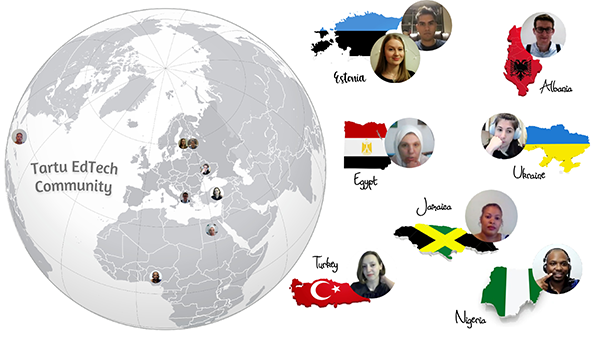The pandemic situation has pushed us to rely more on virtual technologies in daily life for working, studying and socializing. But even before doing everything online became the "norm", some universities in Estonia were already offering online degree programmes for international students. For example, Tallinn University has a fully online joint Master programme with the Cyprus University of Technology - Interaction Design. University of Tartu also has a mostly-online Master programme - Educational Technology. How does studying on these programmes differ from the emergency situation that forced technology to enter in our study routines? We asked the students! Paulo and Jenica from Tallinn University and Amer and Anastasia from University of Tartu were very happy to share their experiences of deciding to study online, before Covid-19 made it a “trend”.

Studying online. Photo: Pexels
The Interaction Design Master programme is a 100% online study programme joint with Cyprus University of Technology that is taught in English and offers the flexibility that students need. As Paulo and Jenica mentioned in their interviews, the classes are asynchronous (most of the materials are pre-recorded) and it is up to the student to find the available time to study. Also, there is the opportunity to choose between studying part-time or full-time or even as a combination of these options as there is a window frame of 4 years total to complete the programme (e.g. full-time the first year and part-time the 2 upcoming years). As the interviewees mentioned, more than 60% of the students on this programme are full-time workers, so the flexibility is invaluable to those who work or have other obligations that do not allow them to study in a physical space or relocate for studies. For them, the option of completely online studies was something that they were looking for and they found it at Tallinn University!

TLU Interaction Design programme student Paulo. Photo: Paulo
Studying online broadens your opportunities regardless of geographical borders as the only thing you need is a computer, a microphone and connection to the Internet. Especially for fields such as Interaction Design and Educational Technology where the focus of the programmes is digital technologies, education can be offered in a completely online format. As the students mentioned, online study programmes are carefully designed and planned so they do not lack in quality, communication or interaction compared to on-campus education. As Paulo said: “It was meant to be online”. It is not just an emergency response to an external factor, as is the case with many other programmes all over the world and according to Paulo “that’s an advantage as we are actually prepared on how to respond in such a situation”.
In addition, the defining characteristic of online education is not the platform that the programme is conducted on, but the way of teaching. The courses are learner-centered (in contrast to traditional education) and the professors are acting as facilitators in the learning process by providing guidance and the necessary tools. Besides the pre-recorded materials, the students are invited to work together and complete assignments on a biweekly basis. That practice encourages them to virtually meet each other, work together and make bonds and connections even if they have never met face to face physically. But do the students miss out on the social experience of studying?

Social life in Tartu
As Jenica mentioned, “There is no doubt that on-campus studies are more entertaining and it’s almost a social experience but it depends on the expectations that someone has for their learning experience”. Currently, she is looking to advance her career and acquire new skills, so the online programme offers her the opportunity to do that without sacrificing hours of her work or personal life to study offline. They feel that they “have become friends with people all over the world” and they hope one day to meet in real life and even visit Estonia and discover more things about the university and the campus. They are getting news and information about what is happening in the University through the university newsletters and they are happy to participate in activities that take place online (such as the Green Month of Tallinn University that takes place this April virtually in English) and as they mentioned, the Study in Estonia blog helps them to know more about Estonia and how it is to live and study here!
Studying online also simplifies the admission process for non-EU/EEA applicants as they do not have to apply for a visa. The collaboration between Tallinn University and the Estonian verification platform Veriff for authenticating ID documents makes it easier for applicants to apply for the programmes they are interested in. The cutting edge platform that DreamApply offers for the admission process together in combination with Veriff’s authentication services ensures a smooth and straightforward admission process for the applicants. Tallinn University recently extended the admission deadline for non-EU/EEA applicants. The new deadline for most Bachelor and Master's programmes is April 15, 2021. For the Interaction Design online programme the deadline for everyone no matter their geographical location is July 01, 2021!

What will the future of education look like? Photo: Pexels
What about the future of online programmes? As Jenica shared with us, it seems that the “pandemic accelerated the pace of online education as it shaped and changed the mentality. The technology and the means to study and work remotely were available but the culture wasn’t there yet”. Online learning gives a great opportunity to those who are seeking for flexibility during their studies, those that don’t consider getting into traditional education but are looking for ways to acquire new skills and even change careers to study and bring their talents, knowledge and expertise to a global scale with much more opportunities.
University of Tartu is ranked in the top 250 universities in the world in education and training according to QS Rankings in 2020 and that is reflected in the quality of programmes they offer. Specifically, University of Tartu has launched the programme Educational Technology, a 1-year online program that is held in English and 90% online. The program includes two in-person meetings in Tartu (one in August before the academic year starts and one in June, when the academic year ends). You still have the opportunity to apply, as University of Tartu has extended the application deadlines to May 15, 2021 for non-EU/EEA applicants for Master programmes in Faculty of Social Sciences and Faculty of Arts and Humanities. The extended deadline for EU/EEA/Swiss/UK students is June 30, 2021.
Anastasia and Amer from UT shared their learning experiences as students in the Educational Technology Master programme, and as the first students that had to join the 100% online experience, due to the pandemic. They were both looking for a learning experience that offered them the possibility to pursue further knowledge in a domain that they really love and already have work experience in, in a flexible format that allows them to work at the same time.

UT Educational Technology programme student Anastasia. Photo: Anastasia
The innovation of this programme is that it promotes collaboration and teamwork so that the participants do not acquire only academic knowledge but also practical and collaborative skills that will help them in their career and allow them to discover the wealth of knowledge and experience that each one of them has. The students learn from each other as they bring different perspectives into the group. Furthermore, the program itself encourages interaction, exchanging of insights and creating connections as the students are called to participate in webinars (in addition to the pre-recorded materials that are already available) where they prepare certain topics and discuss and reflect upon them. As Amer mentioned, “There is a lot of value in the diversity that the program promotes as students live elsewhere in the world and work there and that aspect facilitates networking and gives us insights about how it is to be a teacher in other countries, for example in Kazakhstan and Egypt. It allows you to draw some parallels and exchange ideas and practices that usually might not come up in a classroom where the students are quite homogenic regarding the country of origin or the current city of residence”.

UT Educational Technology student Amer. Photo: Amer
As the programme was designed to be online (and is not a response to the restrictions due to Covid-19), the use of digital technologies in community building and teamwork is deeply engrained within the programme. It allows students, alumni, and university staff to connect and collaborate in projects. They can even write their thesis in a small team rather than individually, as Anastasia described. The professors are aware of the needs of the students and they support them with immediate and sufficient feedback, according to Amer.
Studying online also takes away all the constraints regarding time and place. By being able to study from your computer, you save so much time that otherwise would be spent on commuting between campus and your home. Especially for people that are also working, this time is quite valuable as they can spend it doing something else. Also, studying in an asynchronous format gives students the possibility to choose courses than in a traditional format they couldn't choose due to timetable overlap. How many times have you encountered the situation during your studies to drop an elective course that you were in love with because there was a compulsory course at the same time?

International community of UT Educational Technology programme. Photo: tartuedtech.org
Amer and Anastasia see the future of education with a rapid increase in online programmes not only due to the Covid-19 impact, but because of the fact that people have started valuing their time more and exploring the possibilities that online education offers them. Traditional education targets mostly people aged 18-24 years old, that can fully dedicate themselves to studying for a few years. Online education offers the possibility of studying to all age groups and specifically for those that are facing time and place constraints due to other obligations (e.g. working full-time, having family commitments) or living in a country where the education system is not so well-developed and does not offer sufficient opportunities for learning. Online education is there to welcome everybody who is willing to learn. You just need to show interest and be open to join!
Text: Katerina
